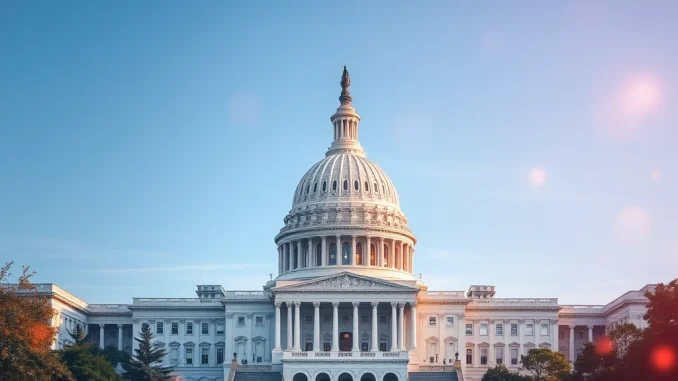
Attention, crypto and tech enthusiasts! A significant legislative step is underway in the United States Senate that warrants your attention. According to insights shared by Eleanor Terrett, host of Crypto in America, the US Senate is currently engaged in a key procedural vote.
Understanding the Senate Vote Process
What exactly is happening on Capitol Hill? The vote in question is a motion to proceed with the debate on the GENIUS Act. This isn’t the final vote on the bill itself, but a critical step to move the legislative process forward. Think of it as agreeing to discuss the matter seriously before deciding on its final form.
This development follows a recent cloture vote held on Monday. Cloture is a procedural motion that effectively ends debate and forces a vote on the matter at hand. In this case, the 66–32 vote indicated strong support for moving past initial hurdles and allowing the bill to be formally debated.
- Motion to Proceed: A procedural move to bring a bill or other measure before the Senate for consideration.
- Cloture Vote: A vote to end debate and prevent filibustering, requiring a three-fifths majority (60 senators). The 66-32 vote easily cleared this threshold.
- Amendment Process: If the motion to proceed is approved, the Senate will then enter a phase where senators can propose changes or additions (amendments) to the bill. This is often a detailed and sometimes lengthy process.
What is the GENIUS Act and Why Does it Matter?
While the initial report from a crypto host suggests relevance to the digital asset or broader tech space, understanding the specifics of the GENIUS Act is key. Past iterations of legislation with similar names have focused on areas like STEM education, research, and workforce development. These areas are foundational to innovation and technological advancement, which directly or indirectly impacts the environment for blockchain technology, artificial intelligence, and other emerging fields relevant to crypto.
The fact that a prominent voice in the crypto space is highlighting this suggests the bill, or at least the policy discussions surrounding it, likely touches upon themes important to the future of technology and innovation in the U.S.
Navigating the Policy Debate: Challenges and Opportunities
Moving to the debate phase opens the floor for senators to discuss the merits of the bill, voice concerns, and propose amendments. This phase presents both challenges and opportunities:
- Opportunities: This is where specific provisions can be added or modified to better support innovation, potentially addressing areas like digital literacy, funding for relevant research, or creating frameworks that could be conducive to technological growth. Stakeholders can engage with their representatives to influence the outcome.
- Challenges: The amendment process can introduce complexities, potentially adding provisions unrelated to the bill’s core purpose or creating disagreements that slow down or halt progress. Diverse interests across the Senate can lead to difficult negotiations.
The legislative journey is often intricate, involving multiple readings, committee reviews, and votes in both the Senate and the House of Representatives before a bill can become law.
Tracking the Legislation: What Comes Next?
Assuming the motion to proceed passes, the focus shifts entirely to the debate and amendment phase. Here’s what to watch for:
The specific amendments proposed will reveal more about the areas of focus senators wish to address. These could range widely depending on the bill’s scope. Following the amendment process, the Senate will eventually hold a final vote on the amended bill. If it passes the Senate, it would then need to be reconciled with any version passed by the House of Representatives before heading to the President’s desk.
Actionable Insight: Stay informed by following reports from sources tracking legislative developments, particularly those focusing on technology and innovation policy in the US Senate. Understanding the proposed amendments will be crucial for anticipating the bill’s final form and potential impact.
Summary
The US Senate‘s vote to proceed with the GENIUS Act debate marks a significant procedural step in the legislative process. Following a strong cloture vote, the Senate is poised to enter a detailed amendment phase. While the full scope of the GENIUS Act and its direct relevance to specific sectors like crypto are still unfolding through the debate, its focus on innovation-related policy makes it a development worth tracking for anyone interested in the future of technology and its regulatory landscape. The coming debate will shed more light on the specific policy directions senators wish to pursue.



